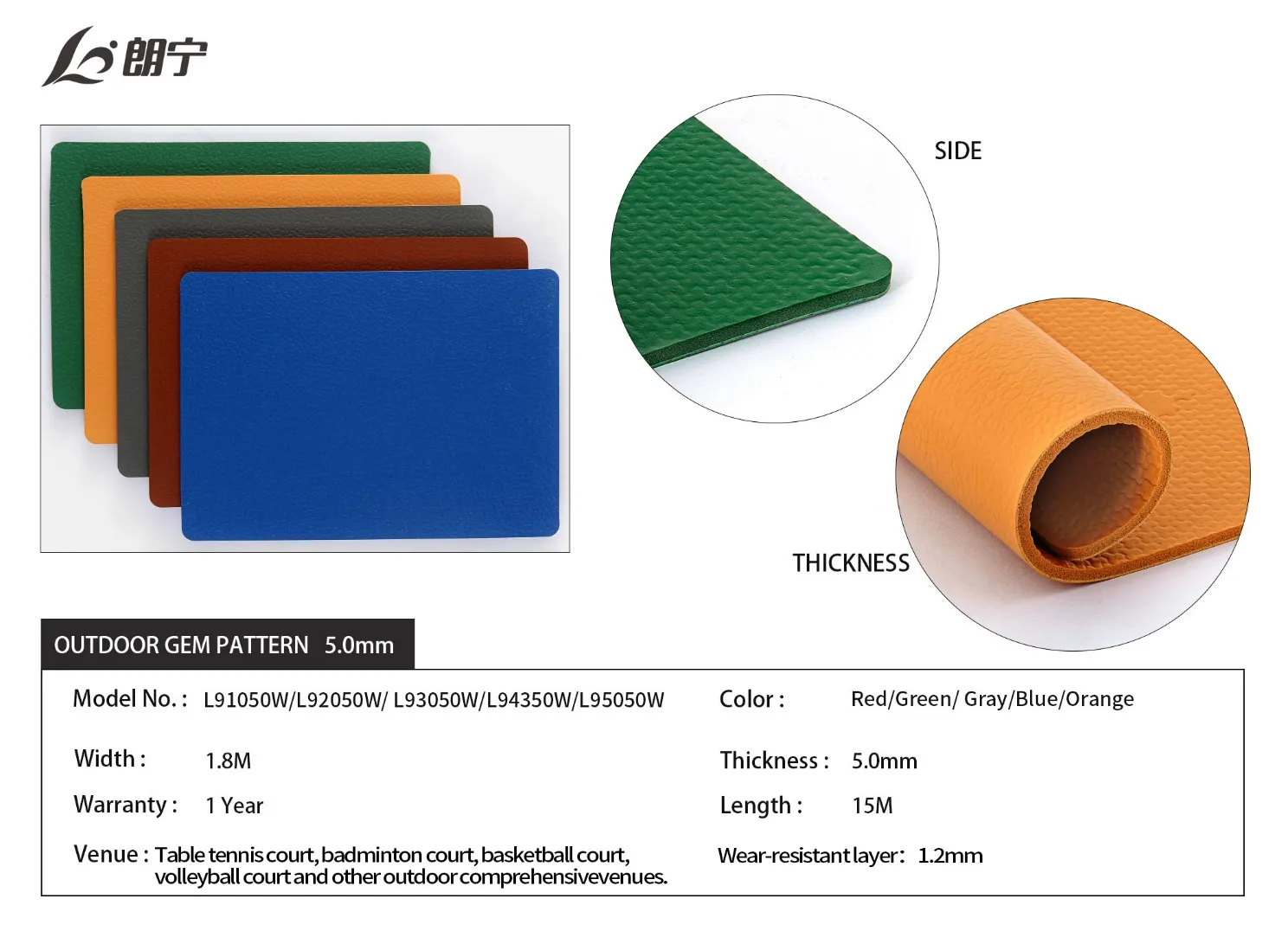commercial floor tile types
Exploring Commercial Floor Tile Types A Guide for Businesses
When it comes to flooring for commercial spaces, selecting the right type of tile is crucial. Not only does the flooring play a vital role in the aesthetic appeal of the environment, but it also affects functionality, durability, and maintenance. With a plethora of options available, understanding the different types of commercial floor tiles can assist business owners in making informed decisions. Let’s delve into the most common types of commercial floor tiles and their unique characteristics.
1. Ceramic Tiles
Ceramic tiles are a popular choice for commercial settings due to their durability and resistance to moisture. Made from natural clay and fired at high temperatures, these tiles come in various sizes, colors, and finishes. They are easy to clean, making them a suitable option for restaurants, retail stores, and healthcare facilities. Moreover, glazes can enhance their stain resistance, ensuring longevity even in high-traffic areas.
2. Porcelain Tiles
Porcelain tiles are a subtype of ceramic tiles but are denser and less porous, giving them superior strength and water resistance. They are ideal for both indoor and outdoor applications, making them versatile for various commercial environments. Available in an array of designs, including wood-like finishes and stone textures, porcelain tiles can effortlessly blend aesthetics with functionality. Their low maintenance and high durability make them a favorite for shopping malls, airports, and public buildings.
3. Vinyl Tiles
Vinyl tiles have gained popularity in commercial flooring due to their affordability and versatility. They come in a wide range of designs, mimicking natural materials like wood and stone without the high cost. Vinyl tiles are resilient, making them comfortable underfoot, and they can withstand heavy foot traffic, which is essential in busy settings like hotels and offices. Additionally, vinyl flooring is waterproof, making it a suitable choice for areas prone to spills and moisture.
commercial floor tile types

4. Luxury Vinyl Tiles (LVT)
Luxury Vinyl Tiles (LVT) take the benefits of traditional vinyl to the next level with enhanced design and durability. These tiles are thicker and often feature a multi-layer construction that includes a photographic design layer, providing a realistic appearance. LVT is soft underfoot and sound-absorbent, making it a popular choice for hotels, healthcare facilities, and schools where noise reduction and comfort are paramount.
5. Rubber Tiles
Rubber flooring is commonly used in commercial spaces like gyms, hospitals, and daycare centers due to its excellent slip resistance and shock absorption properties. Rubber tiles are available in various colors and thicknesses, allowing for customizable flooring solutions. They are also incredibly durable and can withstand heavy impact, making them ideal for areas with high foot traffic or where equipment is frequently moved.
6. Carpet Tiles
Carpet tiles combine the comfort of traditional carpeting with the practicality of tiles. They are particularly suited for office environments, providing warmth and sound insulation. Carpet tiles come in various textures, colors, and patterns, allowing for creative floor layouts. The modular nature of carpet tiles also means that individual tiles can be replaced when damaged, making maintenance straightforward and cost-effective.
Conclusion
The selection of commercial floor tiles is a significant decision for any business. Each type of tile offers unique benefits that cater to different needs and environments. When choosing the right flooring, consider factors such as durability, maintenance, comfort, and aesthetic appeal. By selecting the appropriate commercial floor tile type, businesses can create welcoming spaces that enhance customer experience while ensuring long-term functionality and style. Whether it’s the elegant finish of porcelain, the versatility of vinyl, or the comfort of carpet tiles, the right choice can greatly influence the atmosphere and efficiency of a commercial environment.
-
Commercial Parquet Flooring: Considerations of Aesthetics, Practicality, And SustainabilityNewsApr.15,2025
-
PVC Sports Flooring: Performance, Applications, And Development TrendsNewsApr.15,2025
-
PP Interlocking Floor: a Paving Solution That Combines Functionality and SustainabilityNewsApr.15,2025
-
Plastic Flooring Tiles Outdoor: Practicality, Sustainability, And Development ProspectsNewsApr.15,2025
-
On the Application of PVC Flooring for Badminton Court in Badminton VenuesNewsApr.15,2025
-
Commercial Wood Flooring: the Balance Between Aesthetics, Functionality, And SustainabilityNewsApr.15,2025
-
The Ultimate Guide to Futsal FlooringNewsMar.27,2025

